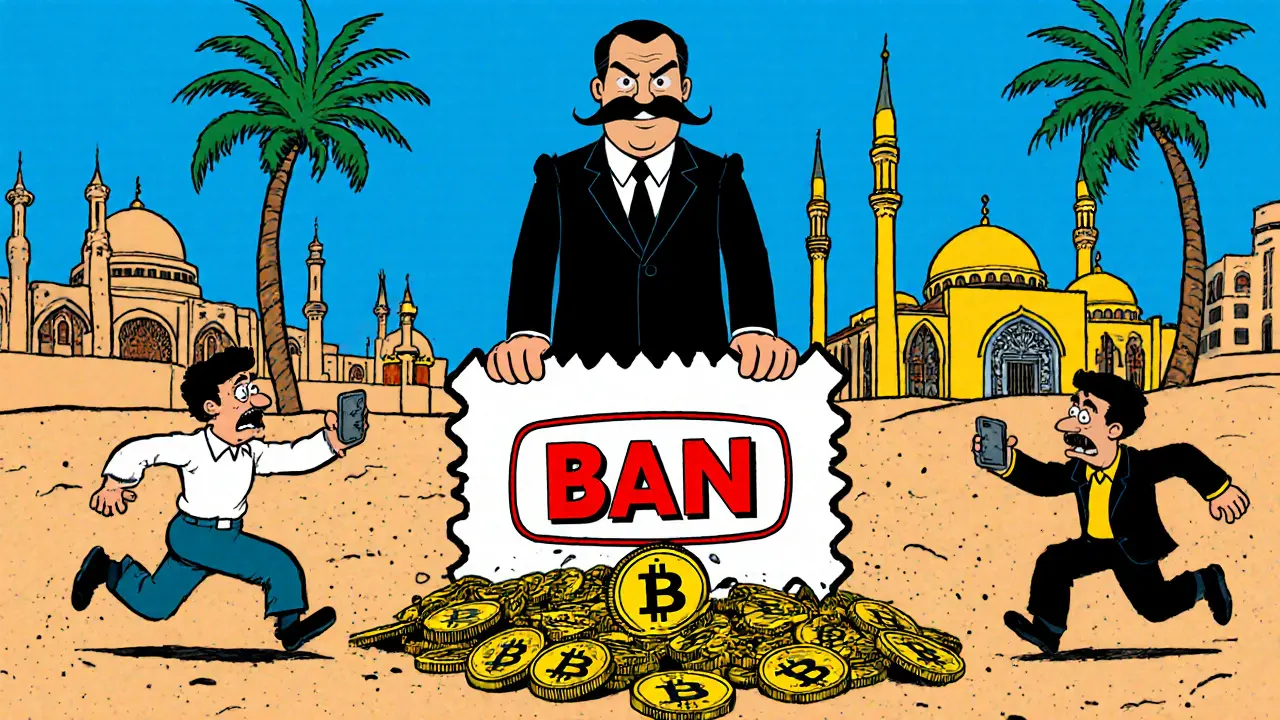Egypt Crypto Investment Risk Calculator
Warning: Crypto trading is illegal in Egypt. This calculator estimates potential losses from scams based on global data, not legal consequences.
Risk Assessment
High Risk In Egypt, 80% of crypto investments result in full loss due to scams.
Based on Egypt's strict crypto ban and global scam statistics, this tool shows the potential loss you could face if you participate in illegal crypto trading.
Potential Loss:
0 EGP
This represents the estimated maximum loss from crypto scams. In Egypt, the Central Bank has reported that 78% of crypto-related transactions involve fraudulent activities. Remember that the CBE has blocked all crypto-related transactions through banks and payment systems.
Since 2020, it has been illegal to trade, issue, or promote cryptocurrencies in Egypt. Not just discouraged - not just warned against. Actually illegal. The Central Bank of Egypt (CBE) made this clear with Law No. 194/2020, and as of 2025, that law hasn’t changed. If you’re buying Bitcoin, selling Ethereum, or running a crypto exchange in Egypt, you’re breaking the law.
What the Law Actually Bans
Law No. 194/2020 doesn’t just block trading platforms. It shuts down everything. No buying. No selling. No mining. No advertising crypto services. Even promoting a crypto wallet or sharing a Bitcoin address publicly can be seen as a violation. The CBE doesn’t just say ‘be careful’ - it says ‘don’t do this at all.’ The law gives the central bank full control over any digital currency activity. No exceptions. No gray areas. If it’s crypto and it’s not approved by the CBE, it’s banned. That includes Bitcoin, Ethereum, Dogecoin, stablecoins, and even new tokens created in Egypt. The only way to legally operate is to get permission from the CBE - and no one has ever received it.Why Did Egypt Go So Hard Against Crypto?
There are three big reasons behind the ban. First, the CBE fears losing control of Egypt’s money supply. If people start using Bitcoin instead of Egyptian pounds, it becomes harder to manage inflation, interest rates, and currency value. In a country where the pound has lost nearly half its value since 2022, the central bank can’t afford any alternative systems that weaken its grip. Second, there’s serious concern about consumer harm. Many Egyptians, especially young people and those with limited financial literacy, have been lured by stories of quick riches from crypto. But scams are common. People lose life savings to fake exchanges or phishing apps. The CBE has issued at least five official warnings since 2020, all stressing the same thing: crypto investments carry immense risk and offer no legal protection. Third, there’s religion. In 2018, Egypt’s top Islamic authority, Al-Azhar, issued a fatwa declaring cryptocurrencies haram - forbidden under Islamic law. That wasn’t just a religious opinion. It became part of the cultural and legal backdrop. Many Egyptians who might have considered crypto think twice now, not just because it’s illegal, but because their faith tells them it’s wrong.So How Is It Enforced?
Here’s the messy part: enforcement is weak. The law exists on paper. The warnings are loud. But actual prosecutions? Rare. There are no public records of anyone being fined, jailed, or even formally charged for using crypto in Egypt. The U.S. State Department’s 2025 Investment Climate Report notes that while the ban is official, enforcement remains unclear. Why? Because crypto is hard to stop. Transactions happen peer-to-peer. You don’t need a bank. You don’t need to show ID. You can buy Bitcoin from someone in a Cairo café using a mobile wallet - and the CBE has no way to track it. Even if they wanted to, monitoring thousands of anonymous wallets across a population of 110 million is practically impossible. Instead of raids or arrests, the CBE relies on deterrence. Banks and payment processors are ordered to block any transactions linked to crypto exchanges. If you try to use your Egyptian bank account to send money to Binance or Kraken, the transfer will be rejected. ATMs won’t let you withdraw cash for crypto purchases. Payment apps like Fawry and Vodafone Cash have filters that flag crypto-related payments. So while people still trade - and they do - they do it quietly. Over WhatsApp. Through peer-to-peer marketplaces. Using foreign wallets and cash deposits. The ban works more as a wall than a net.
But What About Blockchain? Isn’t That Different?
Yes. And that’s where things get interesting. Egypt doesn’t hate technology. It just hates uncontrolled money. The government has quietly embraced blockchain - the underlying tech behind crypto - for real-world uses. At Egypt’s ports, the Advanced Cargo Information (ACI) system now uses blockchain to track shipments. It cuts fraud, reduces delays, and makes customs checks faster. That’s not speculation. That’s logistics. And it’s working. The Ministry of Finance is testing blockchain for land registration. Instead of paper deeds that can be lost or forged, property records could be stored on a tamper-proof digital ledger. Pilot programs are already running in Alexandria and Luxor. Even remittances - money sent home by Egyptians abroad - are being rethought. The CBE is exploring a blockchain-based system that could lower fees and speed up transfers from the Gulf or Europe. No crypto involved. Just the same tech, used responsibly. This split approach is smart. Ban the risk. Keep the tool.What About CBDC? Is Egypt Planning a Digital Pound?
Yes. And it’s a big clue about the future. The CBE has publicly stated it’s researching a Central Bank Digital Currency (CBDC) - a digital version of the Egyptian pound. Unlike Bitcoin, this wouldn’t be decentralized. It would be fully controlled by the central bank. You’d use it like cash, but on your phone. This isn’t just theory. The CBE has partnered with international financial institutions and conducted technical trials. A pilot could launch as early as 2026. Why? Because a CBDC gives the government all the benefits of digital money - faster payments, lower costs, better tracking - without losing control. It’s the exact opposite of crypto. And that’s exactly what Egypt wants.
